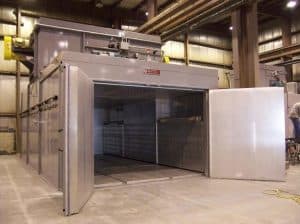Wisconsin’s Economy Benefits from Engineering
Since the 19th century, Wisconsin has held a place a prominence in the pantheon of centers of engineering. In 1926, for example, the American Society of Civil Engineers, working with the staff of the Milwaukee School of Engineering, crafted an agreement that merged them both with the Engineers and Scientists of Milwaukee. By 1938, the organization had grown and called itself the Wisconsin Section.
The Importance of Engineering to Wisconsin’s Economy
While not as crucial as dairy, which contributes $45.6 billion to Wisconsin’s economy annually, engineering is nevertheless an integral part of the state’s economic well-being. Most of the engineering effect is involved with Wisconsin’s manufacturing sector. Engineers constantly seek to streamline processes, create better, longer-lasting parts and machines for that manufacturing, and move toward green solutions. As Wisconsin’s economy becomes more and more diversified, engineering will become more and more important than ever before because it will be part of everything.
Not everything has been “all rosy,” however. A new Foxconn manufacturing facility near Milwaukee that was expected to create 22,000 new, high-paying jobs fell short of expectations. Despite this shortfall, engineers in Wisconsin have made a significant contribution to the state’s economic output. Engineering disciplines that have made a major impact include:
- Civil engineers
- Electrical engineers
- Mechanical engineers
- Chemical engineers
- Industrial engineers
- Materials engineers
- Automation and process controls engineers
- Ceramic engineers
Wisconsin’s economy has maintained a growth rate of 2.7 percent, which was only 0.2 percent less than that of 2018. Considering Wisconsin’s 31st place in growth of real earnings in the United States, that is quite a feat. Also, Wisconsin’s wages are growing. They’re just growing slower than in other places in the country. Real wage growth in the U.S. has been slow, too, for decades as companies seek to maximize profits at the expense of worker salaries.
Check out this documentary highlighting a significant manufacturing facility located in Wisconsin.
Wisconsin GDP and Employment Projections
In 2018, Wisconsin’s GDP grew to $336 billion, which was a rise of roughly $15 billion from the end of 2017. That’s 4.4 percent, which is higher than the rise of the country’s GDP during the same period.
When it comes to engineering jobs, the fastest-growing sector is in civil engineering. By 2024, there will be 5,460 additional jobs in that field. Civil engineering technicians will grow, but the numbers will be much smaller: just 1,690 jobs over the next five years. Still, that is 109.7 percent over the number of jobs in 2019. The engineers themselves will grow at 114 percent.
According to the Bureau of Labor Statistics, most engineers, in the manufacturing industry or otherwise, make up between one and two jobs per 1,000 jobs in the state. Some engineering fields, however, have a high relative standard error when it comes to sampling sizes, so there might be far more people in a certain field than first thought. In Wisconsin, aerospace engineering is one such field. The Bureau of Labor Statistics lists only 50 such jobs in the entire state. Conversely, there are nearly 7,000 civil engineers in Wisconsin, so the numbers regarding their salaries and growth potential are far more trustworthy.
Salaries for Engineers and Related Jobs in Wisconsin
Entry-level engineers in Wisconsin can expect to make about $62,000 annually while experienced engineers can make upwards of $86,000. Managers in the field earn roughly 20 percent more than that, and their numbers go up with seniority as well. Engineers in different fields, such as instrumentation, process, or civil can earn more based on the position and on their level of education.
Having a graduate degree not only boosts someone’s chances of earning a higher wage, but it also enables someone to get better jobs faster. Of the top 10 best-paid and easily found jobs to get with a master’s degree, four are in different subfields of engineering: computing, biomedical, telecommunications, and electrical. Rather than a mere bump of 20 percent in salary, these four fields give prospective engineers salaries of between $129,000 and $141,000 annually.
Engineering Schools in Wisconsin
There are 57 engineering schools in Wisconsin. Not all are of the same caliber, and the Milwaukee School of Engineering leads the pack. According to U.S. News and World Report, not only is the school ranked No. 8 in the West Region, but it is also ranked No. 9 for engineering nationally. In the subcategories of civil, computer, mechanical, and electrical engineering, the Milwaukee School of Engineering also ranks in the top 10 nationally. It is also the No. 9 Best Value School in the nation, and if students are veterans, they’ll get quite a fair shake because the school is ranked No. 6 in that regard.
The University of Wisconsin is much larger than the Milwaukee School of Engineering, but its engineering program ranks No. 22, according to U.S. News and World Report. The industrial engineering department is No. 6, and the chemical department is No. 8, both of which are national rankings. The nuclear engineering rank is No. 4 nationally, behind only the University of Michigan, the Massachusetts Institute of Technology, and the University of North Carolina. The University of Wisconsin also offers graduate students a similar level of excellence.
Marquette University is ranked No. 84 among all universities in the country, but their engineering department, ranked No. 3 in Wisconsin, is No. 120 nationally. Their engineering graduate school ranks No. 118. Some of the lesser-known engineering schools in Wisconsin include Concordia University, Carthage College, and Carroll University. These schools, however, are much smaller in scale than the first three as are much of the rest of the 57 institutions classified as engineering schools.
Overview
Wisconsin has a good job growth outlook over the next five years. Engineering forms a significant part of the state’s GDP and economic growth. The salaries in the state compare favorably to those of engineers around the country. Interested parties should contact the Bureau of Labor Statistics, the Wisconsin Department of Workplace Development, or other such entities.
Are You a Wisconsin Professional Engineer
Are you a Wisconsin engineer who needs to renew your license? Check our out summary of state professional engineer license renewal requirements. Our summary includes forms, due date, license costs, and much more.
Continuing Education Packages for WI Engineers
PDH-Pro developed continuing education packages for professional engineers that are guaranteed to meet the Wisconsin Engineering board requirements.
